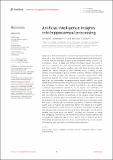Artificial intelligence insights into hippocampal processing
Author(s)
Wirtshafter, Hannah S.; Wilson, Matthew A.
Downloadfncom-16-1044659.pdf (1005.Kb)
Publisher with Creative Commons License
Publisher with Creative Commons License
Creative Commons Attribution
Terms of use
Metadata
Show full item recordAbstract
<jats:p>Advances in artificial intelligence, machine learning, and deep neural networks have led to new discoveries in human and animal learning and intelligence. A recent artificial intelligence agent in the DeepMind family, muZero, can complete a variety of tasks with limited information about the world in which it is operating and with high uncertainty about features of current and future space. To perform, muZero uses only three functions that are general yet specific enough to allow learning across a variety of tasks without overgeneralization across different contexts. Similarly, humans and animals are able to learn and improve in complex environments while transferring learning from other contexts and without overgeneralizing. In particular, the mammalian extrahippocampal system (eHPCS) can guide spatial decision making while simultaneously encoding and processing spatial and contextual information. Like muZero, the eHPCS is also able to adjust contextual representations depending on the degree and significance of environmental changes and environmental cues. In this opinion, we will argue that the muZero functions parallel those of the hippocampal system. We will show that the different components of the muZero model provide a framework for thinking about generalizable learning in the eHPCS, and that the evaluation of how transitions in cell representations occur between similar and distinct contexts can be informed by advances in artificial intelligence agents such as muZero. We additionally explain how advances in AI agents will provide frameworks and predictions by which to investigate the expected link between state changes and neuronal firing. Specifically, we will discuss testable predictions about the eHPCS, including the functions of replay and remapping, informed by the mechanisms behind muZero learning. We conclude with additional ways in which agents such as muZero can aid in illuminating prospective questions about neural functioning, as well as how these agents may shed light on potential expected answers.</jats:p>
Date issued
2022-11-07Department
Massachusetts Institute of Technology. Department of Biology; Picower Institute for Learning and Memory; Massachusetts Institute of Technology. Department of Brain and Cognitive SciencesPublisher
Frontiers Media SA
Citation
Wirtshafter, Hannah S. and Wilson, Matthew A. 2022. "Artificial intelligence insights into hippocampal processing." 16.
Version: Final published version
ISSN
1662-5188
Keywords
Cellular and Molecular Neuroscience, Neuroscience (miscellaneous)